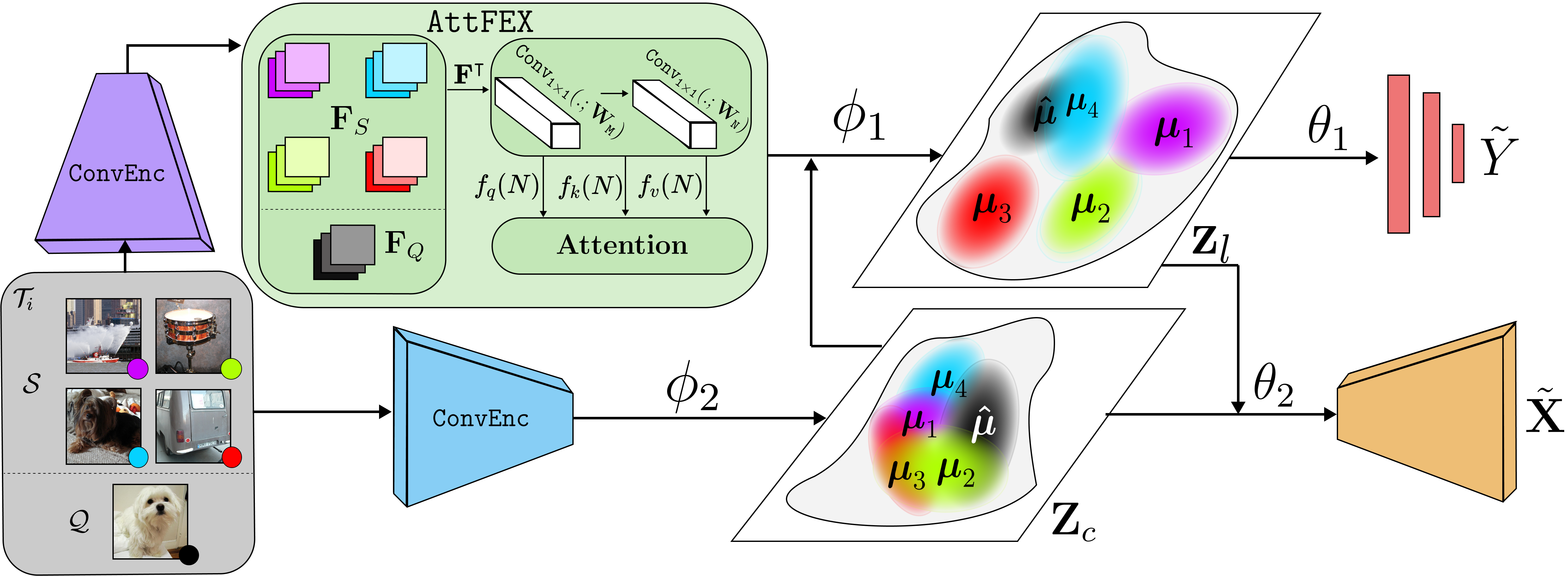CodeBase of TRIDENT
This is the official repository for Transductive Decoupled Variational Inference For Few Shot Classification
(Anuj Singh, Hadi Jamali-Rad)
Now published in the Transactions on Machine Learning Research - TMLR
Abstract
The versatility to learn from a handful of samples is the hallmark of human intelligence. Few-shot learning is an endeavour to transcend this capability down to machines. Inspired by the promise and power of probabilistic deep learning, we propose a novel variational inference network for few-shot classification (coined as TRIDENT) to decouple the representation of an image into semantic and label latent variables, and simultaneously infer them in an intertwined fashion. To induce task-awareness, as part of the inference mechanics of TRIDENT, we exploit information across both query and support images of a few-shot task using a novel built-in attention-based transductive feature extraction module (we call AttFEX). Our extensive experimental results corroborate the efficacy of TRIDENT and demonstrate that, using the simplest of backbones, it sets a new state-of-the-art in the most commonly adopted datasets miniImageNet and tieredImageNet (offering up to 4% and 5% improvements, respectively), as well as for the recent challenging cross-domain miniImagenet --> CUB scenario offering a significant margin (up to 20% improvement) beyond the best existing cross-domain baselines.
Key Idea
The proposed approach is devised to learn meaningful representations that capture two pivotal characteristics of an image by modelling them as separate latent variables: (i) zc representing semantics, and (ii) zl embodying class labels. Inferring these two latent variables simultaneously allows zl to learn meaningful distributions of class-discriminating characteristics decoupled from semantic features represented by zc. We argue that learning zl as the sole latent variable for classification results in capturing a mixture of true label and other semantic information. This in turn can lead to sub-optimal classification performance, especially in a few-shot setting where the information per class is scarce and the network has to adapt and generalize quickly. By inferring decoupled label and semantics latent variables, we inject a handcrafted inductive-bias that incorporates only relevant characteristics, and thus, ameliorates the network's classification performance.
Walkthrough
Directories containing the mentioned files/scripts and their descriptions:
configs: Contains train and test configs of mini and tieredImagenet for (5-way, 1 and 5-shot) settings. The params have been set to their corresponding best hyperparameter settings. For more details on what each field of the .json's mean, check their descriptions insrc/trident_train.py,src/trident_test.py. Make sure to check that the paths in their respective fields are set correctly.data: Contains scripts of dataloaders inloaders.pyand task generators intaskers.py.dataset: This is where the .tar's of all the datasets are to be extracted. (read more about this in the next section)logs: This is where the .csv's of the logs generated by train/test scripts are saved. Set the path to this directory in thelog_pathfield of .json configs.models: The best models for each setting are to be kept here. These are loaded and run for thetrident_test.pyscripts of their corresponding settings. We obtained the best model at the 82,000-th and 67,500-th iteration for (5-way, 1-shot) mini and tieredImagenet tasks respectively, and at the 22,500-th and 48,000-th iteration for (5-way, 5-shot) mini and tieredImagenet tasks, respectively.src/zoo: Contains all the model architectures inarchs.pyand the loss functions, inner-update function and task loaders intrident_utils.py.src: Contains thetrain.py,test.pyscripts, and theutils.pyscript responsible for logging and saving and .csv's, models.pt's and latents.pt's.
Data:
We use the datasets miniImagenet and tieredImagenet provided by Ren et al, 2018. "Meta-Learning for Semi-Supervised Few-Shot Classification." ICLR '18 and the dataset of CUB200-2011 from here and make use of the splits given by Chen et al..
- miniImagenet: Use this link to download the dataset. Extract the .tar file in the
datasetdirectory. - tieredImagenet: Use this link to download the dataset. Extract the .tar file in the
datasetdirectory. - CUB200-2011: Use this link to download the dataset. Extract the .tar file in the
datasetdirectory in thecubirds200directory.
Run Scripts:
First use the requirements.txt file to create an environment containing all the necessary libraries and packages. Then use these commands to run train and test scripts:
python -m src.trident_train --cnfg PATH_TO_CONFIG.JSON
python -m src.trident_test --cnfg PATH_TO_CONFIG.JSONThe trained models for all the settings and datasets have been provided here.
Analyze the logs:
Run the analyze.ipynb notebook to analyse the logs generated by running the train/test script.
Contact
Corresponding author: Anuj Singh (anujrsingh1@gmail.com; a.r.singh@tudelft.nl)
References
This repository utilizes and builds on top of the learn2learn software library for meta-learning research.
Citation
@article{
singh2023transductive,
title={Transductive Decoupled Variational Inference for Few-Shot Classification},
author={Anuj Rajeeva Singh and Hadi Jamali-Rad},
journal={Transactions on Machine Learning Research},
issn={2835-8856},
year={2023},
url={https://openreview.net/forum?id=bomdTc9HyL},
note={}
}






